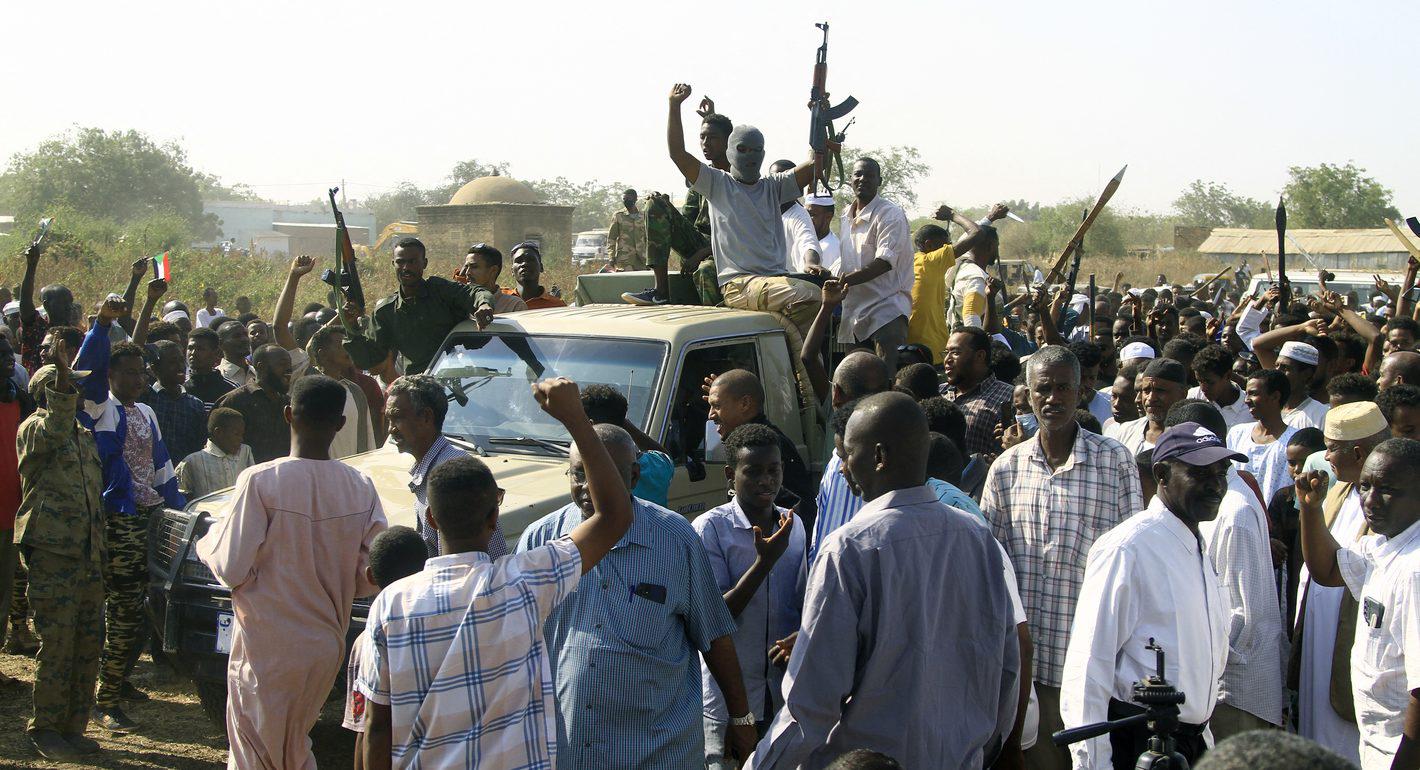{
"authors": [
"Youseif Basher"
],
"type": "commentary",
"blog": "Sada",
"centerAffiliationAll": "dc",
"centers": [
"Carnegie Endowment for International Peace"
],
"collections": [],
"englishNewsletterAll": "menaTransitions",
"nonEnglishNewsletterAll": "",
"primaryCenter": "Carnegie Endowment for International Peace",
"programAffiliation": "MEP",
"programs": [
"Middle East"
],
"projects": [],
"regions": [],
"topics": []
}
Source: Getty
Sudan: Armed Popular Resistance and Widening Civil Unrest
The Rapid Support Forces’ takeover of Gezira state marks a pivotal moment in the Sudanese conflict, with tens of thousands of civilians picking up weapons to engage in armed resistance.
Since April 15, 2023, the ongoing conflict between the Sudanese army and the Rapid Support Forces (RSF) has provided a fertile environment for the proliferation of weapons throughout the country, even in previously safe areas. In June, Abdel Fattah Al-Burhan, commander of the armed forces, issued a call for general mobilization and prompted security forces in numerous cities to start training thousands of young men in public squares. Enraged by this development, the RSF retaliated by recruiting thousands from Darfur, the region from which most of their soldiers hail.
On December 3, at the army headquarters in Gezira state, Burhan announced that nearly 40,000 had been mobilized to participate in military operations against the RSF. Soon afterward, the RSF seized upon this statement as a pretext to take full control of the state— the second most populous in the country and the site of the largest agricultural irrigation project—and capitalized on the sudden withdrawal of both the army and security forces.
As the RSF took over Gezira, its members committed terrible atrocities—meticulously documented by civil society organizations and peaceful protest movements— and its leaders threatened to invade the states of Sennar, White Nile, Gedaref, and the Nile River. Feeling increasingly vulnerable to RSF aggression and spurred on by the army's encouragement, tens of thousands of Sudanese civilians took up arms.
The army pledged to arm additional civilians who were affiliated with the armed popular resistance across central, northern, and eastern Sudan, despite the lack of a formal leadership structure. Governmental officials also began to attend mass activities organized by the resistance, and state-owned media channels, under the military's jurisdiction, provided them with extensive coverage.
Pro-democracy political forces have objected to civilian mobilization, viewing it as a tactic endorsed by the regime of ousted President Omar al-Bashir. However, there are two primary motives driving civilians to take up arms. The first is political, stemming from the army's aspiration to rebalance power dynamics after losing several bases in strategic locations such as Khartoum, Gezira, and four out of five states in the Darfur region. By encouraging civilian mobilization and supporting armed movements, the army believes it can take the offensive in the conflict. The second is existential, linked to Sudanese citizens' determination to defend themselves, their property, and their communities against anticipated RSF incursions. This reflects their lack of confidence in the army’s ability to protect them, coupled with a heightened certainty of the RSF’s brutality.
The growing proliferation of weapons, however, raises concerns about the potential for civil unrest, similar to the conflict that the Darfur region has witnessed during the current war. Official statistics reveal that even before the start of the war, there were eight million weapons are in the hands of civilians. This had helped to fuel deadly attacks by various population groups, extending from Darfur and Kordofan to the Blue Nile region.
The protracted war has disrupted civil, commercial, and agricultural activities, and has forced people to use arms to obtain resources—especially to acquire land, which in Sudan is a way to achieve wealth and local power. So far, all the data confirm that the expanding attainment of weapons among civilians will be used to settle family, clan, and tribal disputes, and as hate speech further polarizes Sudanese society, the intensity and geographic scale of the conflict will likely only increase.
As hopes fade for a negotiated settlement in the near future that would end the war, the possibility of defections within the army and the Rapid Support Forces becomes more likely. This could pave the way for new war leaders to emerge, leading to a dangerous escalation as conflicting parties seek to arm their respective social base areas with both light and heavy weaponry and carry out revenge attacks.
The situation in Sudan demands strong international pressure on the two warring sides to resolve their differences and initiate a political transition process to transfer power to civilian authorities. Without effective international intervention, Sudan may descent into civil unrest, potentially spilling over into neighboring countries with tribal connections such as Chad.
Youseif Basher is a Sudanese journalist. Follow him on X @YouBasher.
About the Author
Youseif Basher
Carnegie does not take institutional positions on public policy issues; the views represented herein are those of the author(s) and do not necessarily reflect the views of Carnegie, its staff, or its trustees.
